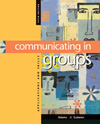Socialization in Online Groups Previous chapters have introduced you to the Internet as a tool for communication
among small group members. Because of the Internet, groups can now be formed
and sustained entirely through electronic communication channels such as chatrooms,
instant messaging, and e-mail. Many online groups have "frequently asked question" or FAQ documents
that explain norms and expectations for group members. For instance, you might
belong to a discussion group devoted to your favorite sports team. One norm
for that group might be that members not post commercial messages (e.g., advertisements)
or that members avoid using swear words. Assume that you are assigned to coordinate the communication among group members
in an online group. What do you think should be in your group's FAQ document?
More specifically, what norms and expectations do you think should guide your
group? Use the following website to get started thinking about your FAQ document: http://jade.wabash.edu/wabnet/info/netiquet.htm After jotting down some ideas for your FAQ document, consider how the process
of socialization in online groups is both similar to and different from face-to-face
groups. Are FAQ documents useful for online groups? Would FAQ documents be useful
for face-to-face groups? If you have participated in online groups, how did
socialization occur in that group? | 


 2003 McGraw-Hill Higher Education
2003 McGraw-Hill Higher Education